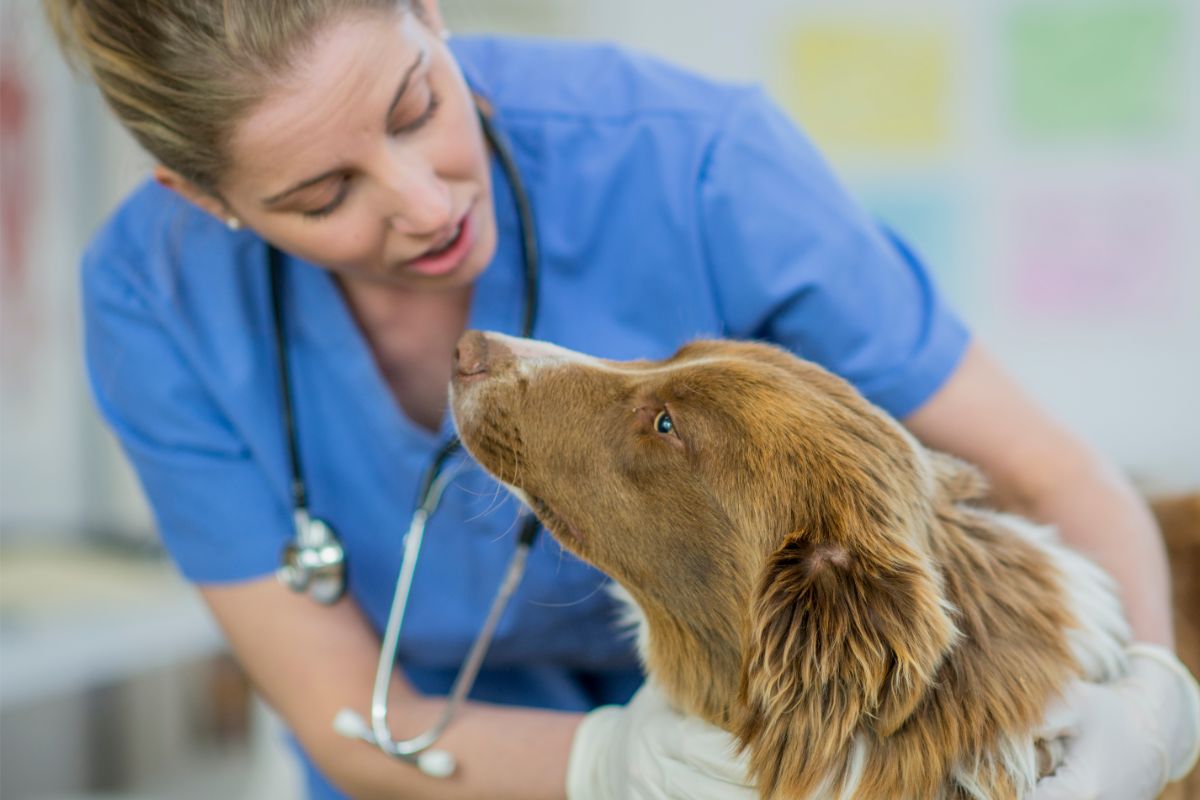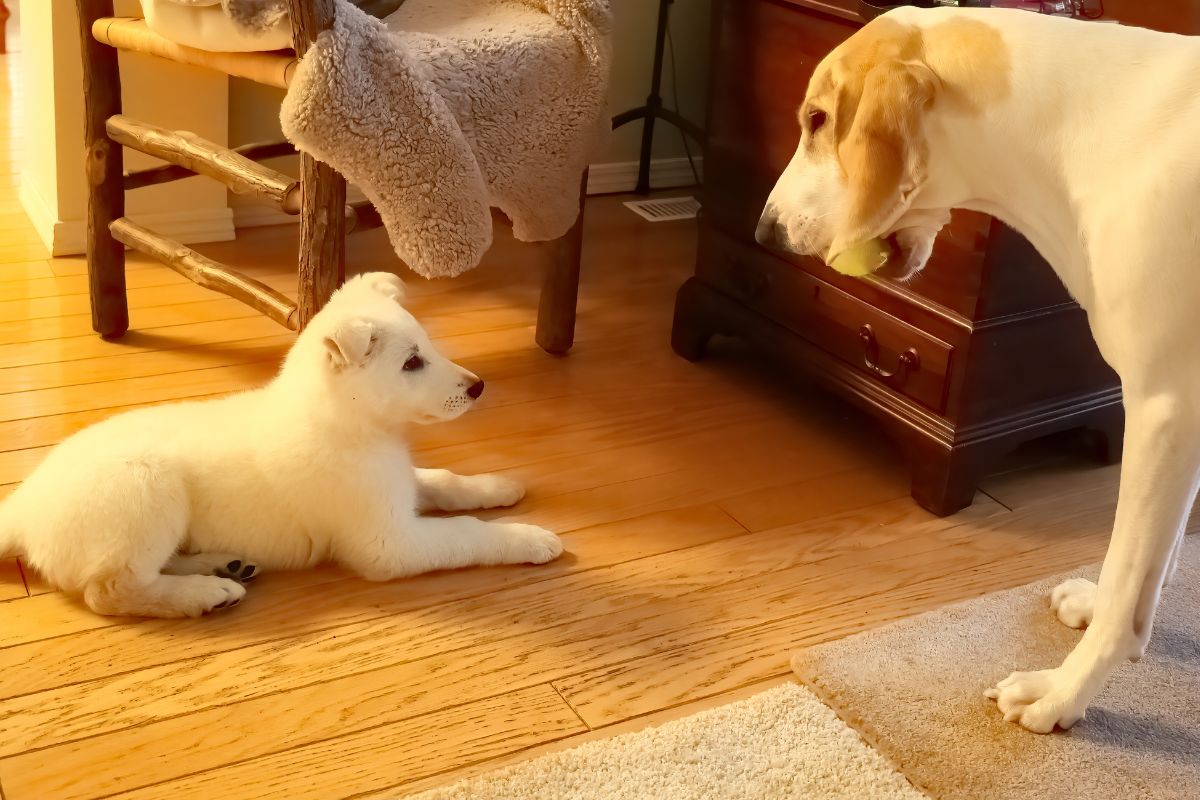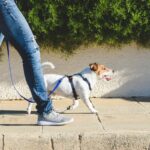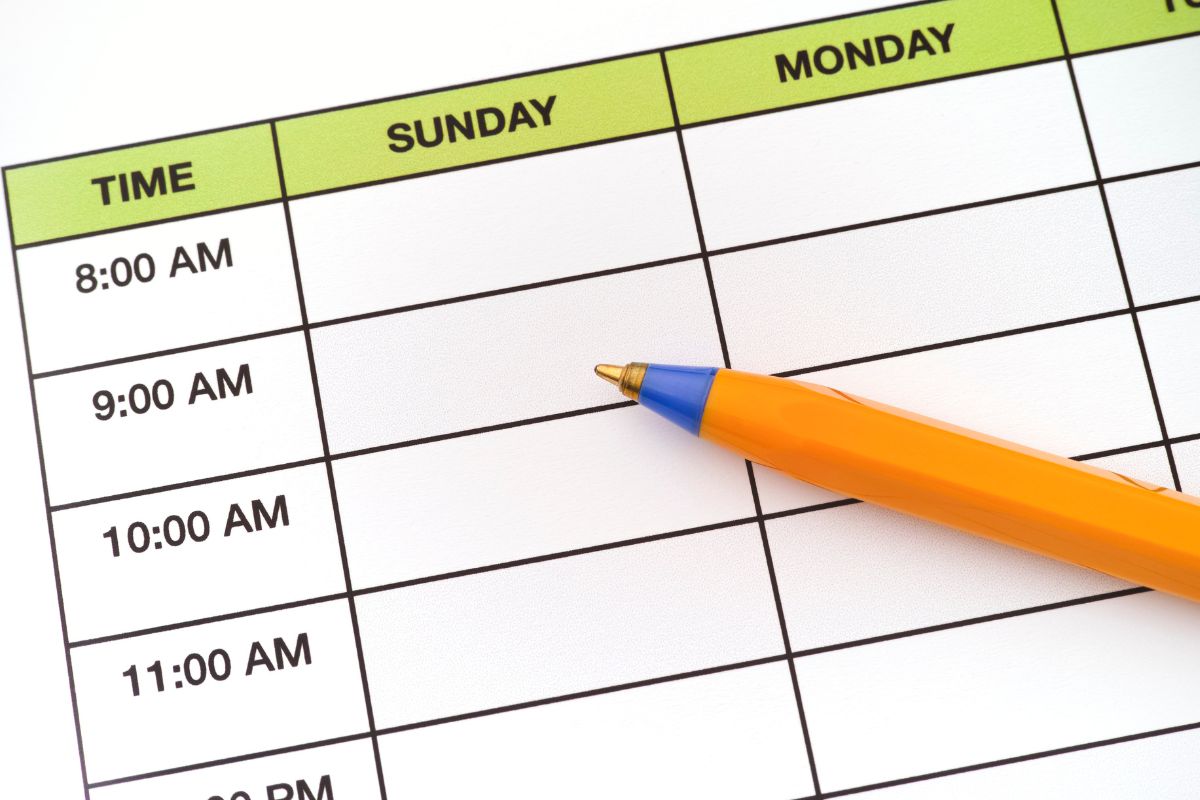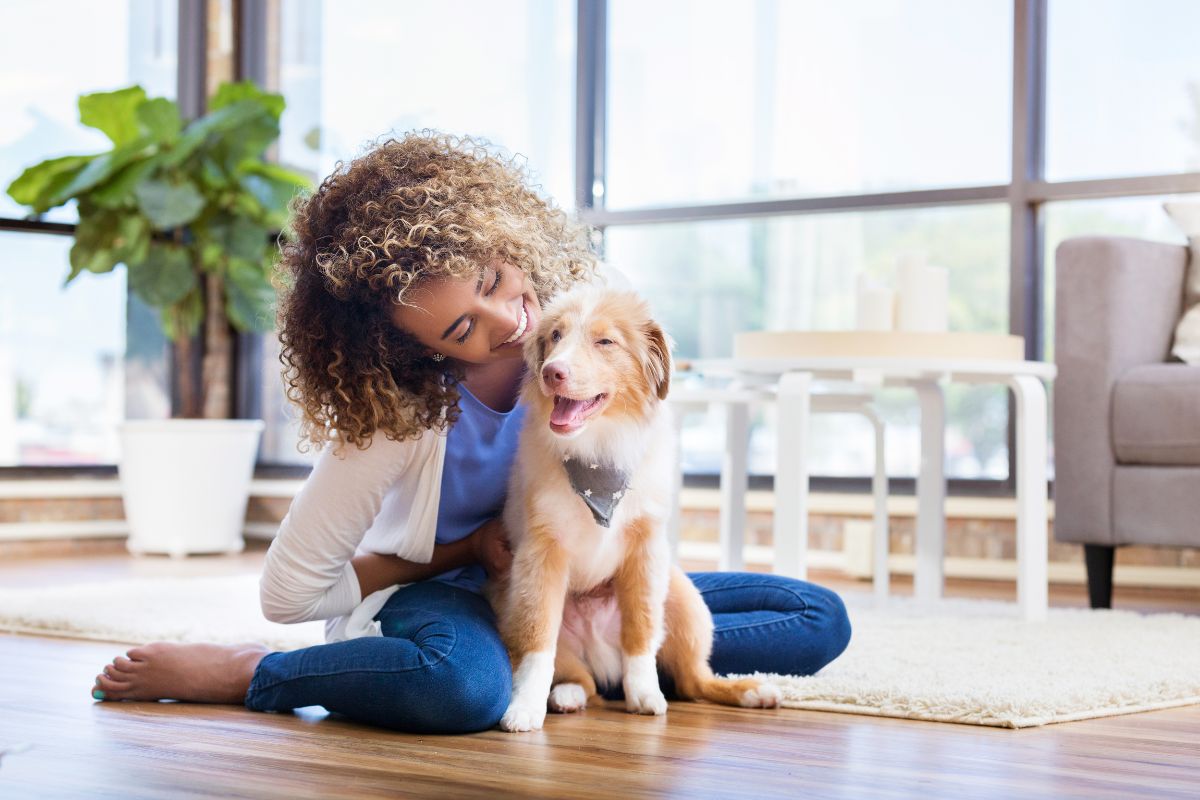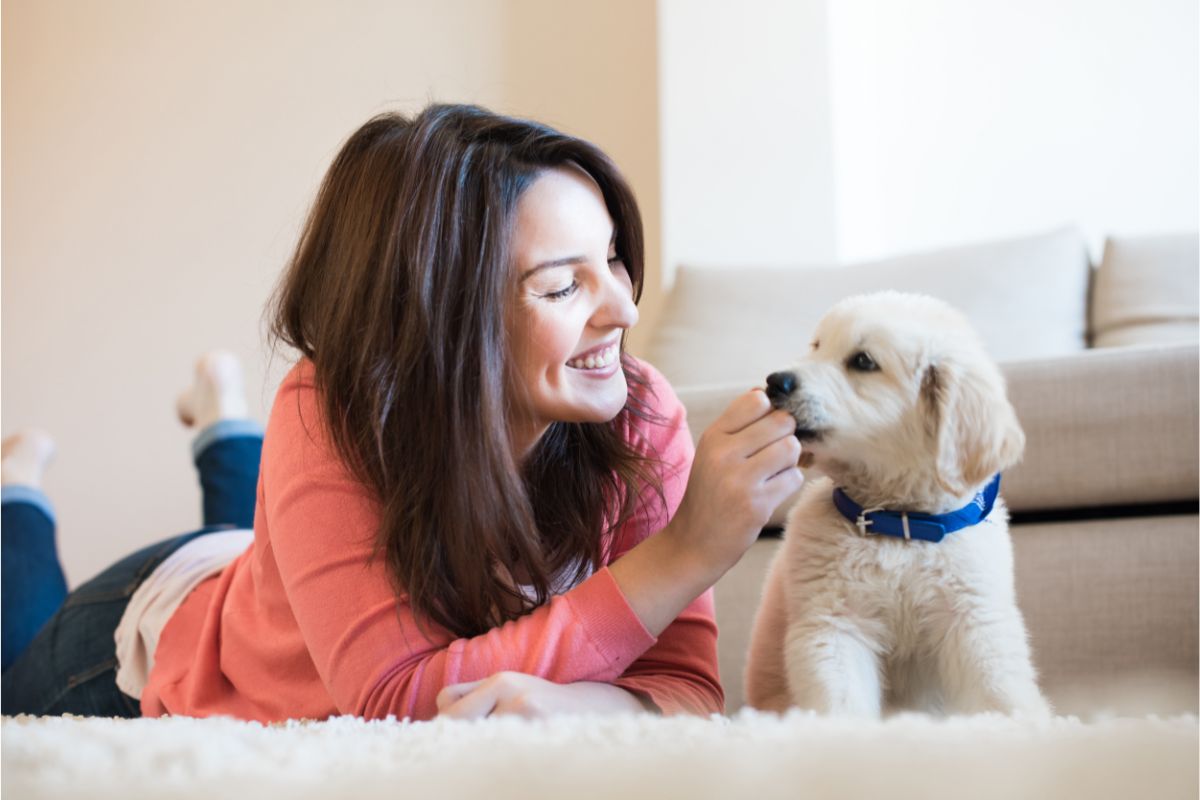Dogs are naturally curious and hungry (read: greedy) creatures, and they’ll give anything a gobble if they have the opportunity.
While there are plenty of human snacks your dog can enjoy – in moderation – there are also others that are incredibly harmful.
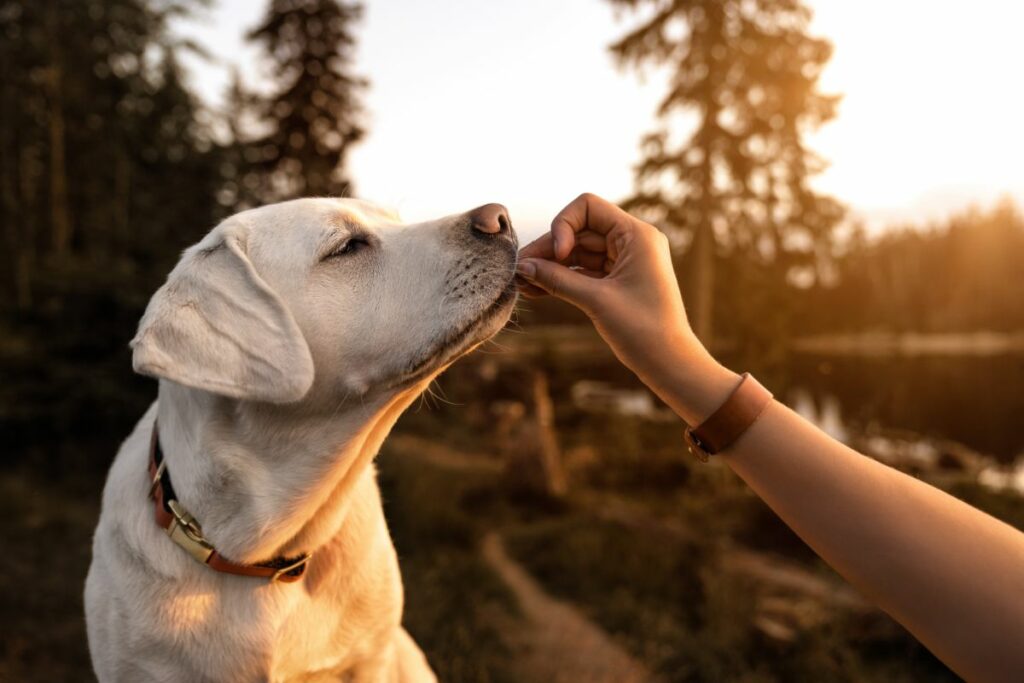
And poisonous food is only one half of the problem.
The other thing to consider is the plants and flowers you have around your home and garden, as many can be dangerous for dogs.
And it’s also worth being aware of other items around your household that can prove fatal if a dog consumes them.
We know this sounds a little scary, but as long as you’re clued up, you can prevent any unwanted accidents and keep your dog safe and well.
Keep reading to find out what’s poisonous to dogs.
Food Items That Are Dangerous Or Poisonous To Dogs
Dogs are expert snack sniffers. As soon as you open the refrigerator or the pantry to get something to eat, a little wet nose appears.
Nothing is sacred when you have a dog, and you’ll often end up sharing your snack after looking into those sad, hungry puppy dog eyes.
While some foods and drinks we enjoy as humans are perfectly safe for dogs and can be consumed in moderation, there are others that can prove to be very dangerous.
Some of these are obvious and are frequently talked about – like chocolate – but others are a little more obscure, and it can be easy to be caught out.
Below is a list of foods that can be dangerous for your pooch:
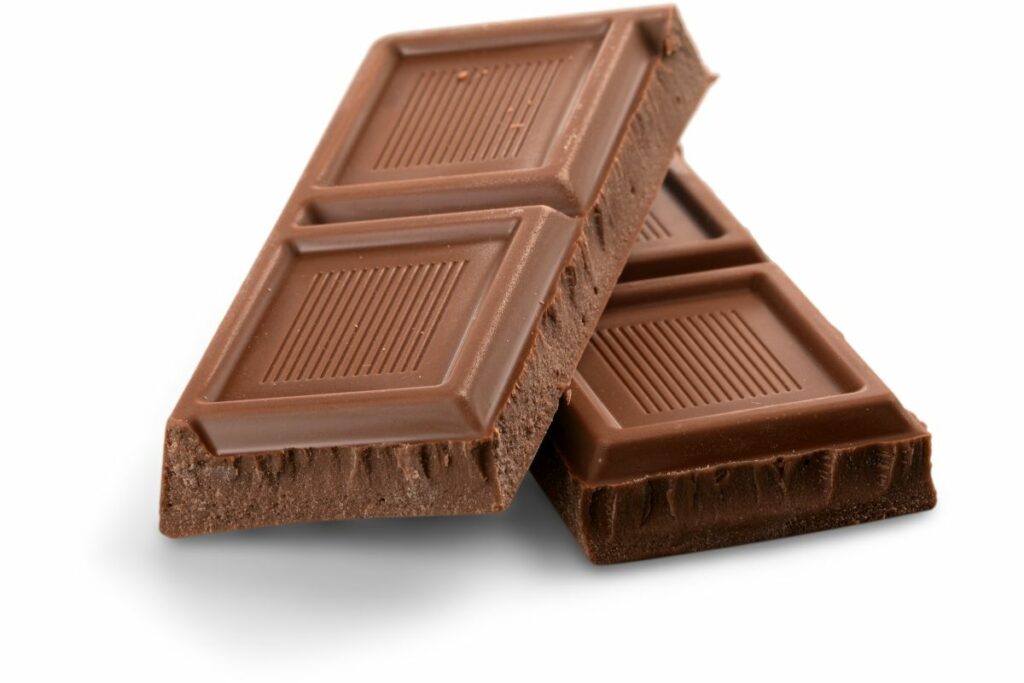
- Chocolate: This is one that most people are familiar with and will avoid their dogs eating.
Chocolate contains theobromine which is toxic to dogs. Dark chocolate contains much higher levels, but all chocolate and cocoa products can be dangerous.
You should avoid giving your pooch chocolate at all costs.
There are tons of doggy chocolate on the market now, so if you’re having a sweet treat, your pooch can indulge in something that’s safe for them.
This is a great option around celebration times, like Christmas and Easter, when you’re indulging in chocolate treats – just break out the bar of doggy chocolate or that bag of doggy chocolate drops for your pooch to join in. - Onions: This may not be the first food your pooch goes for, but it’s important to keep them away from onions.
They can cause red blood cell damage, which can lead to anemia. They can also cause gastrointestinal issues. - Garlic: Garlic should be avoided for the same reason as onions.
Anything in the onion family can be dangerous for your pooch. - Chives: Chives are grouped with onions and garlic in terms of their toxicity to dogs.
They can cause red blood cell and gastrointestinal problems. Consuming too much of anything from the onion family at once can lead to poisoning. - Grapes: Although healthy for us, grapes are bad for your furbaby.
Grapes are toxic for dogs and can cause liver failure. - Raisins/sultanas/currants: Just like grapes, raisins, sultanas, and currants are all toxic for your pooch.
It’s important to be aware if they are in a snack that you’re offering to your dog. If, for example, your cake contains raisins, your dog can’t have a taste. - Macadamia nuts: Macadamia nut cookies are off the menu for your dog as these nuts can be dangerous.
Just a small quantity of these nuts can make your pup really unwell. And, combined with chocolate, can prove to be fatal. - Avocado: This is one that causes a bit of controversy, but we would advise steering clear of avocados.
The persin present in avocados can make your pooch unwell, and avocado stones can become lodged in their intestines. - Tomatoes: This is another one that causes some debate.
Green tomatoes, as well as the stems and the leaves, can make your dog ill.
Ripe tomatoes are generally fine, but as this isn’t an essential food for dogs, it’s best to steer clear. - Alcohol: It goes without saying that alcohol is toxic for your pet.
Alcohol is dangerous for dogs – it will make them intoxicated and can lead to poor health and even central nervous system damage.
You could get doggy beer, though, if you really want to enjoy a drink with your furry best friend. - Salt: Too much salt can dehydrate your dog and can even lead to sodium ion poisoning, so please avoid sharing any salty snacks with your pup.
- Peanuts: We mentioned macadamia nuts earlier, but peanuts, and other nuts, can also be dangerous for dogs.
Peanuts, in particular, are often coated in salt too, which, as we’ve just mentioned, can prove to be toxic. - Caffeine: Your dog may want to join in with your morning cuppa, but caffeine isn’t good for dogs.
In large quantities, caffeine can have a detrimental impact on your dog’s heart. - Cooked bones: Years ago, it was common to give your dogs the bones after you’d cooked your meat – waste not, want not! But this is actually incredibly dangerous.
Bones are a serious choking hazard, and once chewed, they can also splinter and cause intestinal issues. - Unbaked bread dough: This is one that most people wouldn’t even think about, but if you’re baking, be careful not to turn your back in case your dog swipes your dough.
The raw dough will continue to expand in your pet’s stomach. And the yeast in the dough can lead to alcohol poisoning. - Fatty foods: Just like cooked bones, you may be tempted to give your pooch the fat trimmings off your meat, but this isn’t a good idea.
Fatty foods can lead to pancreatitis in dogs. - Peaches and plums: Stoned fruits are incredibly dangerous for dogs as the stones are a choking hazard, and they can also cause intentional blockages.
The stones from peaches and plums contain cyanide, which is a poison. - Raw meat and fish: Just like in humans, raw meat and fish can lead to food poisoning in dogs.
- Sugary foods and drinks: Too many sugary foods can damage your dog’s teeth, make them overweight, and can even cause diabetes.
- Artificial sweetener (Xylitol): Xylitol, which is an artificial sweetener in many human foods, can be incredibly damaging for your dog.
Xylitol causes our bodies to release insulin, but in dogs, this can lead to hypoglycemia. - Apple seeds: We all know that apple seeds are dangerous for humans, but it’s important to keep them away from Fido too.
Apple seeds contain cyanide which is a poison. - Green potatoes: Potatoes with green areas on their skin have high levels of solanine in them.
In large quantities, solanine can affect the organs and the nervous system.
What Human Foods Can Dogs Enjoy?
While there are a lot of foods that should be avoided, there are some human snacks that dogs can enjoy, too, as long as it is in moderation.
Below is a list of human foods that are generally considered safe for dogs to eat, but remember, they should never replace a balanced diet that is specifically tailored to your dog’s nutritional needs:
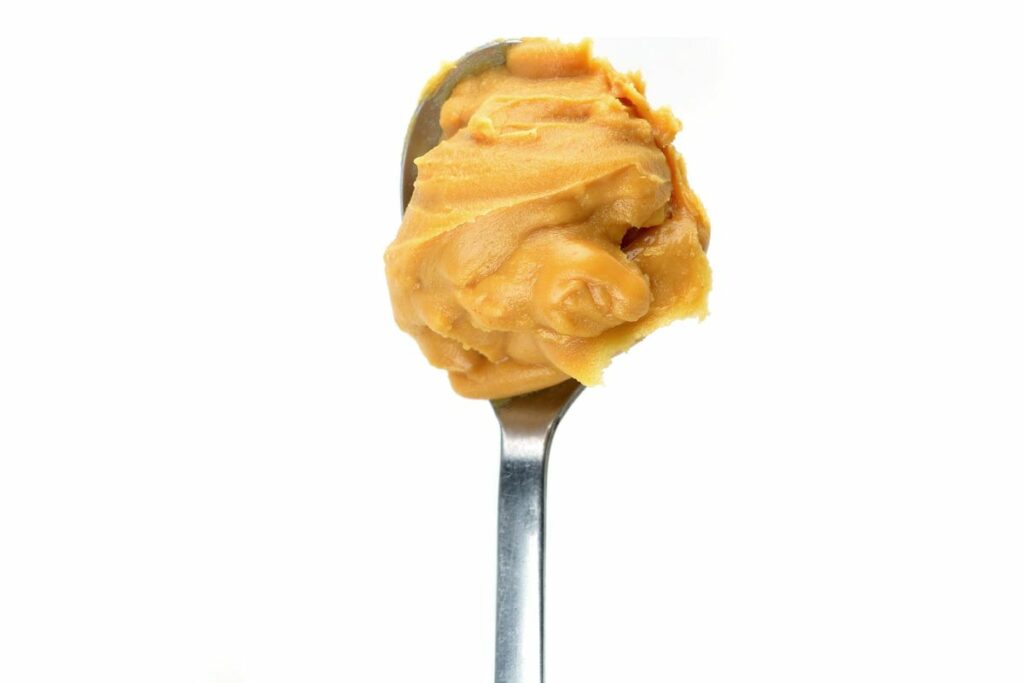
- Peanut Butter (no xylitol): Peanut butter has become quite the popular doggy treat.
It’s a great way to keep your dog entertained if you need to leave them alone for a few hours. Smear a lick mat with peanut butter and let them get stuck in.
Remember that peanut butter is quite calorific, so it must be an occasional snack. - Plain Popcorn: Dogs, like many other pets, can enjoy a plain popcorn snack.
It’s really important that the popcorn is plain, though, as toppings such as butter, salt, or sweetener can prove to be harmful. - Cooked Eggs: Cooked eggs are a healthy and safe snack for your pooch.
They can be particularly helpful if your dog has had an upset stomach – many vets will recommend scrambled eggs as a bland food option while your dog recovers. - Cooked Meat (chicken, turkey, lean beef, pork): Cooked meat can be fed to your dog as an occasional snack, but we wouldn’t recommend giving it to them too often as they may become fussy with their regular dog food in hopes they’ll have cooked meat instead.
Just like with scrambled eggs, boiled chicken can be helpful if your dog has had an upset tummy, but consult with your vet first. - Carrots: Carrots are good for us and our furry best friends. These low-calorie veggies are a great doggy reward, packed full of nutrients.
- Green Beans: Raw and cooked green beans are perfectly safe for dogs. Just remember not to add any butter or salt.
- Apples (seeds removed): While apple seeds are dangerous for doggos, apples themselves are not.
In fact, your pooch will love chowing down on this healthy, crunchy snack. - Bananas: Packed with potassium, dogs can enjoy bananas as a tasty treat in moderation.
Your pooch with love this sweet treat! - Blueberries: Blueberries are packed full of antioxidants, vitamins, and minerals, and they’re low in calories. This makes them a perfect snack for doggies.
- Broccoli: Dogs can enjoy broccoli raw or cooked, but as we’ve mentioned before, it’s important no salt is added.
- Brussels Sprouts: Doggies can enjoy a cooked, plain brussel sprout as a nutritious snack.
- Cantaloupe: Cantaloupe melon is full of vitamins and can be a tasty treat, given to your dog in moderation.
- Cooked Rice: Cooked, white rice is often recommended by veterinarians when your pooch has had an upset stomach.
Cooked brown rice is also safe for dogs as long as there are no flavorings added. - Cooked Pasta: Just like rice, your pooch can enjoy a taste of cooked, plain pasta.
It’s important to make sure there’s no seasoning or sauce on it, though. This isn’t Lady and the Tramp! - Cucumbers: Dogs can enjoy raw cucumber as a tasty, crunchy snack that’s low in calories.
- Oatmeal (no added salt/sweeteners): If your dog wants a sniff of what you’re having for breakfast, then you can offer him some plain, cooked oatmeal.
It shouldn’t be a replacement for a dog-specific diet, though. - Oranges (peeled, no seeds): You may be surprised to know that dogs can enjoy oranges in small quantities. Whether they enjoy it is quite another matter.
- Pears (seeds removed): A slice of pear, with the seeds removed, is a perfectly healthy and low-calorie treat for your pooch.
- Peas: Many varieties of peas are perfectly safe for pups. Garden peas, snow peas, black-eyed peas, and English peas are all okay to give as a treat.
Avoid canned peas, though, and don’t add any butter or salt. - Pumpkin (no spices/sugar): You may have noticed that some wet dog foods contain pumpkin. Well, the fiber in pumpkin is great for your doggie’s digestion.
To feed pumpkin as a treat, opt for the canned variety. - Sweet Potatoes (no seasonings): Sweet potatoes are a healthy snack for dogs.
Make sure they are cooked, that the skin is removed, and no seasoning is added. - Watermelon (no seeds/rind): Watermelon can be offered to your dog as a refreshing treat on a hot summer’s day.
If you are giving your pooch some watermelon, it’s important to remove the skin and pick out the bigger seeds. - Cooked Fish (e.g., salmon): Few dogs will turn their nose up at an offering of cooked fish.
Avoid tuna, but offer your pup cooked fish such as salmon, cod, and haddock can be a healthy addition to your dog’s diet.
Just be sure to remove any bones and don’t cook it in any oil or add any seasoning. - Plain Yogurt (no added sugars/sweeteners): Finally, your dog can indulge in a lick of plain yogurt as a healthy treat.
This can prove to be a welcome and cooling option on a hot day.
Avoid flavored yogurts or anything with sugars or sweeteners. Plain Greek yogurt is usually your best bet.
What Plants Are Poisonous To Dogs?
Dogs love playing outside and letting their hair down – whether that’s in your garden or a local open space, but it’s essential to be aware of the dangers.
Unfortunately, there are many plants that can be poisonous or harmful to dogs. And a lot of owners don’t know what these are or how to identify them.
Most people are aware that lilies are dangerous to cats and dogs, but there are many more plants that you should stop your pup from coming into contact with.
While you can’t avoid certain plants and flowers out in nature, you can be forewarned about which ones are dangerous and keep your eyes on your dog as he explores.
And, when planting your own garden or adding household plants, you can be armed with a list of what to avoid, as well as those that are perfectly safe.
That way, you can rest easy when your dog goes to play outside or ventures into the garden to use go potty.
It’s important to note that the level of toxicity can vary depending on the specific plant and the amount ingested, so the best practice is to avoid all that are remotely dangerous.
Let’s take a look at plants and flowers that can prove to be harmful:

- Aconite (Monkshood)
- Aloe Vera
- Amaryllis
- Angel’s Trumpet (Brugmansia)
- Arrowhead Vine (Syngonium podophyllum)
- Autumn Crocus (Colchicum autumnale)
- Azalea (Rhododendron spp.)
- Begonia
- Bird of Paradise (Strelitzia reginae)
- Black Walnut
- Bleeding Heart (Dicentra spectabilis)
- Bluebell (Hyacinthoides non-scripta)
- Boxwood
- Brunfelsia (Yesterday, Today, Tomorrow plant)
- Buckeye (Horse chestnuts)
- Buttercup (Ranunculus)
- Caladium
- Calla Lily (Zantedeschia aethiopica)
- Castor Bean Plant (Ricinus communis)
- Chalice Vine (Solandra)
- Chinaberry Tree (Melia azedarach)
- Chrysanthemum
- Clivia Lily
- Cocklebur (Xanthium species)
- Coffee (Coffea species)
- Coral Plant (Jatropha multifida)
- Corn Plant (Dracaena fragrans)
- Cyclamen (Cyclamen spp.)
- Daffodil (Narcissus)
- Daisy (Bellis perennis)
- Deadly Nightshade (Atropa belladonna)
- Delphinium (Larkspur)
- Dieffenbachia (Dumb Cane)
- Elephant Ear (Colocasia)
- English Ivy (Hedera helix)
- Foxglove (Digitalis purpurea)
- Geranium
- Giant Hogweed (Heracleum mantegazzianum)
- Gladiola
- Hellebore (Helleborus)
- Hemlock (Conium maculatum)
- Holly (Ilex)
- Horse Chestnut (Aesculus)
- Hyacinth (Hyacinthus orientalis)
- Hydrangea
- Iris
- Japanese Yew (Taxus cuspidata)
- Jasmine (some species)
- Jerusalem Cherry (Solanum pseudocapsicum)
- Jimsonweed (Datura)
- Kalanchoe (Kalanchoe spp.)
- Lantana
- Larkspur (Delphinium)
- Lily (most species, especially Lilium and Hemerocallis spp.)
- Lily of the Valley (Convallaria majalis)
- Lobelia
- Locoweed (Oxytropis and Astragalus spp.)
- Madagascar Dragon Tree (Dracaena marginata)
- Milkweed (Asclepias spp.)
- Mistletoe
- Monkshood (Aconitum)
- Morning Glory (Ipomoea)
- Mother-in-Law’s Tongue (Sansevieria)
- Mountain Laurel (Kalmia latifolia)
- Narcissus
- Nandina (Nandina domestica)
- Nerium Oleander
- Nicotiana (Tobacco plant)
- Nightshade (Solanum)
- Oak Trees (Quercus spp.) – mainly the acorns
- Oleander (Nerium oleander)
- Peace Lily (Spathiphyllum)
- Pencil Cactus (Euphorbia tirucalli)
- Poinsettia (low toxicity)
- Primrose (Primula vulgaris)
- Rhododendron
- Rhubarb (leaves)
- Sago Palm (Cycas revoluta)
- Schefflera (Schefflera arboricola)
- Star of Bethlehem (Ornithogalum umbellatum)
- Sweet Pea (Lathyrus latifolius)
- Tulip (Tulipa)
- Virginia Creeper (Parthenocissus quinquefolia)
- Water Hemlock (Cicuta)
- Wisteria
- Yew (Taxus)
- Yesterday, Today, Tomorrow (Brunfelsia)
What Household And Garden Items Are Dangerous?
Food, drinks, and plants aside, there are a number of other items that you may have around your home or garden that can also poison your dog or make them very ill.
These are items that you’d never intentionally give your dog but that he may come across while poking his nose into cupboards.
Let’s explore them:
- Antifreeze: It’s not uncommon for pets to consume antifreeze if they find a puddle of it that you’ve spilled.
Unfortunately, even consuming a small amount of this substance can prove to be fatal.
Be mindful of any spillages and clean them up immediately to keep your dog safe. - Rodent poisons: If you have a problem with rats or mice, you may be tempted to use poison to eradicate the issue, but bear in mind that these poisons are also dangerous for your pooch.
If you do need to use this option to eradicate pests, make sure there is no way that your dog can get at the poison.
However, if you can, avoid using them all together and opt for other pest removal methods. - Slug And Snail Pellets: Many brands of slug and snail pellets contain metaldehyde which is highly toxic to dogs.
We would recommend using more natural methods to eradicate slugs and snails, as it’s hard to keep sniffing noses away from these pellets when your dog is free-roaming your garden. - E-cigarettes: This one is particularly important if your dog is a chewer!
E-cigs may look fun for a dog to munch on as they don’t know any better, but as we’ve learned, nicotine is incredibly harmful to dogs.
If you do vape, make sure to keep your e-cigarette and your vape juice out of your pooch’s reach at all times.
And, if you drop it, grab it quickly before your dog does. - Batteries: Just like e-cigs, your dog may be tempted to chew a battery if he finds one lying around.
When the battery cell is damaged, it will leak a dangerous substance.
As well as this, the battery cell itself could become lodged in your dog’s stomach. - Ethanol: Ethanol can be found in many household products such as mouthwash, cologne, paints, and more.
If ingested, it can prove fatal to your dogs, so keep ethanol-containing products safely out of reach. - Pain Relief Tablets And NSAIDs: The medication we take for our own ailments isn’t suitable for our pets, so it’s important to keep these somewhere where your dog can’t get to them.
- Vitamin D Supplements And Creams: Consuming an excessive amount of Vitamin D tablets or cream can result in liver failure in your dog, so keep these products somewhere safe.
- Antidepressants And Other Human Medications: Never give your dog medication that you are taking, and always keep it out of reach.
- Marijuana: Even a small amount of marijuana can prove to be toxic for your dog. Avoid smoking it around your pets too.
- Tobacco: Even a small amount of tobacco can make your dog incredibly unwell, so keep it somewhere safe and out of the reach of curious paws and noses.
- Weed Killers And Pesticides: Many of us will use weed killers and pesticides to achieve a more beautiful garden, but it’s important to be cautious as they can prove to be toxic for your pooch.
How To Keep Your Dog Safe From Poisonous Items
As we said at the start, dogs are experts at sniffing out the things that they shouldn’t, just as much as the things they should. When you own a dog, you always have to be one step ahead.
Make sure you’re fully clued up on all foods that can poison or make your dog unwell, and never feed these to your four-legged friend.
If you’re eating these food items, be sure not to leave them unattended, or the temptation to have a taste may prove to be too great for your pooch.
This can be difficult if you have children in the house who will naturally want to share with their best buddy, but teach them that it’s better to give a doggy treat instead.
Or, help them get clued up on human foods that double up as dog-safe snacks.
When it comes to choosing houseplants or planting flowers in your garden, prepare a list of dog-friendly options before you go to the garden center.
If you do have plants or flowers that are poisonous or harmful to dogs, for instance, if someone buys you a bouquet of lilies, make sure you keep them out of the way, somewhere where your dog can’t possibly reach.
Finally, with household items, always make sure you close the lids of bottles and containers tightly and put dangerous items away in cupboards where your dog can’t get at them.
Treat your dog like a toddler when it comes to household items; look for the hazards and the items you don’t want them to get their paws on, and make sure they are well out of the way.
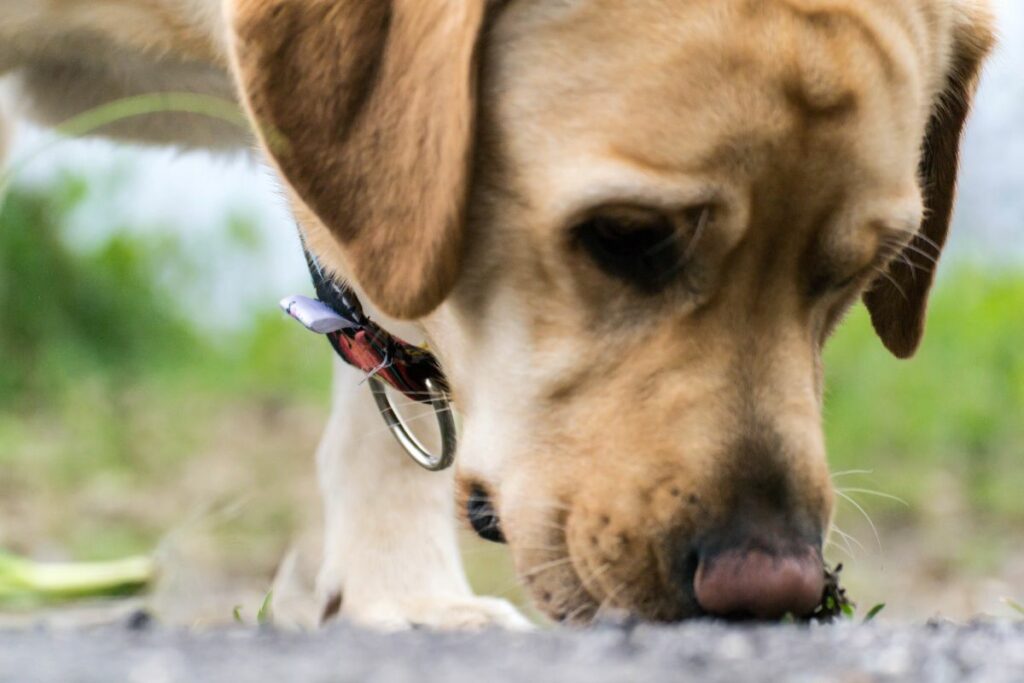
What To Do If Your Dog Has Consumed Something Poisonous Or Potentially Dangerous
Of course, even with all the preparation and care in the world, accidents can and do happen.
Plus, if you’re out and about with your pooch, it only takes a second for them to gobble something down that they shouldn’t if someone else has left it lying around.
If you suspect your dog has consumed something poisonous or harmful, it’s important to seek immediate medical advice.
Call your veterinarian or the out-of-hours vets, provide as much information as possible about what your dog has eaten, and follow their advice closely.
Conclusion
We hope this guide has helped you to understand the foods, plants, and other household items that are poisonous or dangerous to dogs.
It’s in a dog’s nature to sniff out new things and give them a nibble, so it’s our job to make sure they don’t come into contact with anything that can harm them.
And remember, if you do think your dog has eaten something he shouldn’t have, contact your vet immediately.



